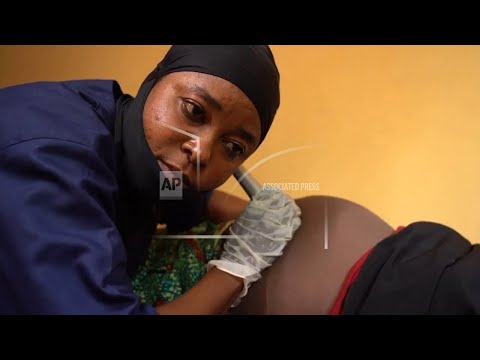(26 Aug 2025)
RESTRICTION SUMMARY:
ASSOCIATED PRESS
Konduga, Nigeria – 22 July 2025
1. Various of women walking in street
2. Mid of women at home, one holding child’s hand
3. Various of women walking in street
4. Various of pregnant woman being examined
5. Various of babies
6. Various of Aisha Muhammed at home
7. SOUNDBITE (Hausa) Aisha Muhammed, mother of twins:
"A lack of good hospitals is our problem, as well as a lack of workers, medication and doctors that can treat us. A lack of access to the road from Konduga to Maiduguri in the night time to visit to the hospital (is also a problem)."
8. Various of Falmata Muhammed at an International Rescue Committee (IRC) clinic
9. SOUNDBITE (Hausa) Falmata Muhammed, 30, pregnant mother:
"I once lost my pregnancy because there was nobody with me at home, and I started feeling sick. I went into labor for more than an hour. I was alone, with no cell phone to call for help. When my husband returned home, I was already bleeding. He rushed me to the hospital, but I lost the child on our way to the hospital because it was too far from our home."
10. Various of Dr. Fanya Fwachabe at the IRC facility
11. SOUNDBITE (English) Dr. Fanya Fwachabe, IRC Sexual and Reproductive Health Manager:
"The reproductive health needs for women and girls is very critical, when you come to the northeast, and specifically in the deep field locations, that’s where there are partial accessibility or mostly inaccessible. So, people in these areas find it difficult to have access to service because the services are either difficult to reach them or even where the services are available, maybe because it’s a garrison town, where it is trenched by the military."
12. Various of Falmata heading home from the IRC clinic
STORYLINE:
Life is already tough for pregnant women anywhere in Nigeria, where one in every 100 women dies giving birth, and at least 75,000 annually, the highest in the world according to the World Health Organization.
Aisha Muhammed was in the third trimester of her pregnancy when she had the convulsions and high blood pressure of eclampsia, a leading cause of maternal death.
Her village’s only health clinic had no doctor, and the only medical help was 40 kilometers (25 miles) away in one of the world’s most dangerous places.
More women die giving birth in Nigeria than anywhere else in the world, according to the World Health Organization. But Muhammed managed to reach the city of Maiduguri and have a cesarean section the next day, delivering twins in April.
The odds are stacked against pregnant women in Nigeria’s northeast like never before.
The deadly Boko Haram militant group is making a resurgence. And hundreds of millions of dollars in foreign aid from the United States, once Nigeria’s biggest donor, have disappeared under the Trump administration this year.
Roads are closed by fighting. Many doctors and other health workers, as well as aid organizations, have fled. In an attempt to make up for the lack of U.S. funding, Nigeria has released an emergency $200 million for its health budget.
Even before these developments, Nigeria had over a quarter of the world’s maternal deaths in 2023 — 75,000 — according to the WHO.
At least one in every 100 women dies giving birth in Africa’s most populous country, which faces chronic underfunding for health systems that cater to 220 million people.
Now, despite the efforts of Nigeria’s military, Boko Haram has been carrying out more assaults, attacking almost daily in the region.
Doctors in Borno can expect to make about $99 to $156 a month.
Find out more about AP Archive: http://www.aparchive.com/HowWeWork
Twitter: https://twitter.com/AP_Archive
Facebook: https://www.facebook.com/APArchives
Instagram: https://www.instagram.com/APNews/
You can license this story through AP Archive: http://www.aparchive.com/metadata/youtube/cb200d3a8c9e4f5892d3032134b52025
Author: AP Archive
Go to Source
News post in August 31, 2025, 6:04 am.
Visit Our Sponsor’s:
News Post In – News





